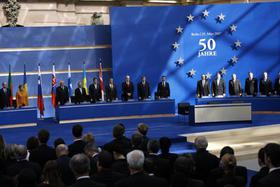Berlin Declaration (2007)
The Berlin Declaration is a formulated by the German EU Presidency document, which was signed on 25 March 2007 on the occasion of the fiftieth anniversary of the conclusion of the Treaty of Rome on an informal summit of the 27 Heads of State and Government in Berlin Arsenal solemnly. The legally non-binding letter of intent should develop an orientation- creating effect within the population of the European Union in terms of values , tasks and structure of the association of states after the introduction of the European Council.
Content
The document, which was seen as symbolic and normative outline of the future political agenda of the German Presidency, initially contains four sections, an evaluation of the European policy of the last 50 years. In the first section the achievements of European integration are accounted for since the signing of the Treaty of Rome establishing the European Economic Community and the European Atomic Energy Community. Following the importance of a European community of values is emphasized and thus justifying the need to ask the European Union to the European elections in 2009 on a constitutional basis. The text speaks avoiding the constitutional concept whose mention was viewed critically in particular by France and the Netherlands because of there failed constitutional referenda, of a " common ground ". Furthermore, fundamental political challenges facing the European Union, such as the environment and climate change, international terrorism are designated. At the request of Spain, the fight against illegal immigration was included as a further internal political objective in the text just before signing the declaration.
Fundamental criticism
Prior to the publication of the announcement has already received criticism including those from the opposition parties in the Bundestag. So criticized several members, the non-transparent decision-making and decision-making that lies to the document to reason and referred the actions of the federal government as a " secret diplomacy " which is on the following necessarily transparent and citizen-oriented constitutional process not conducive. Pope Benedict XVI. expressed in the context of European Bishops' Conference deplored a lack of reference to God in the Declaration on the grounds that Christianity is an essential element for the formation of a European identity. Overall, the Berlin Declaration has received little attention, she fulfilled obviously only a short-term purpose for holding open the reform efforts in the European Union. The federalist European Union Germany described it as "excellent for illustrating the European identity ".










